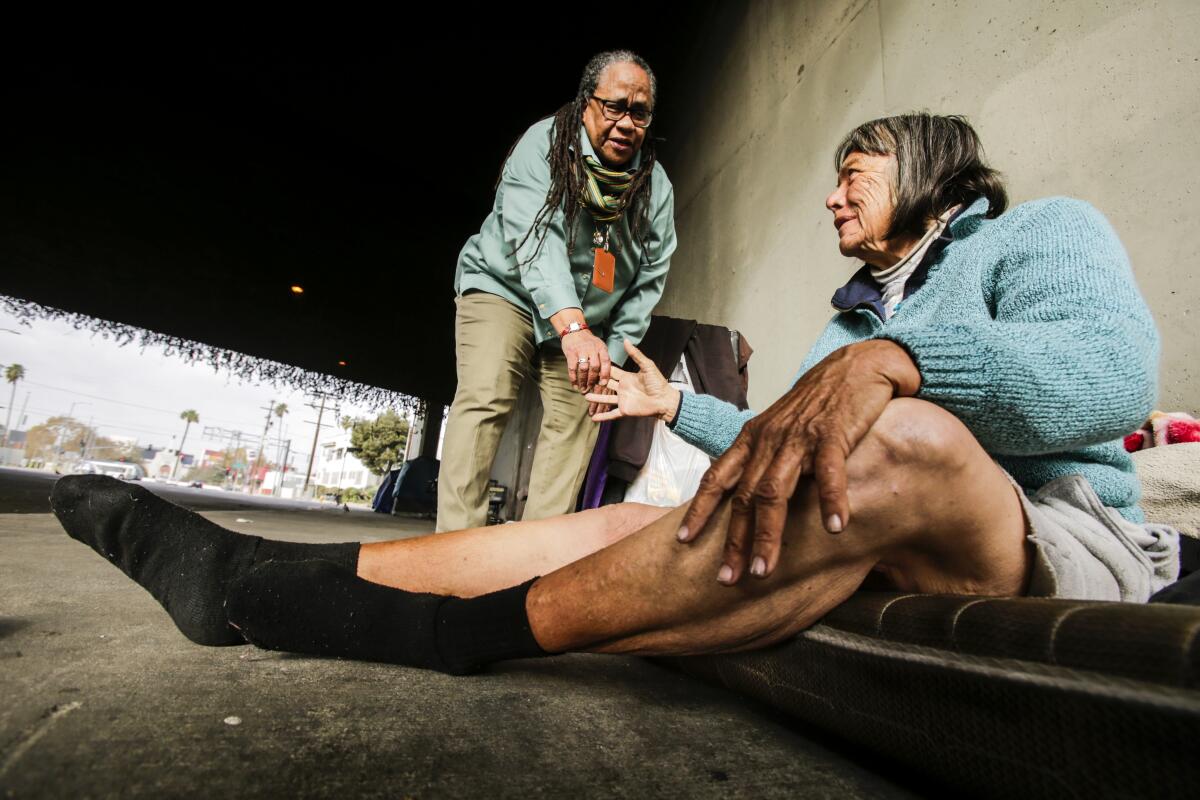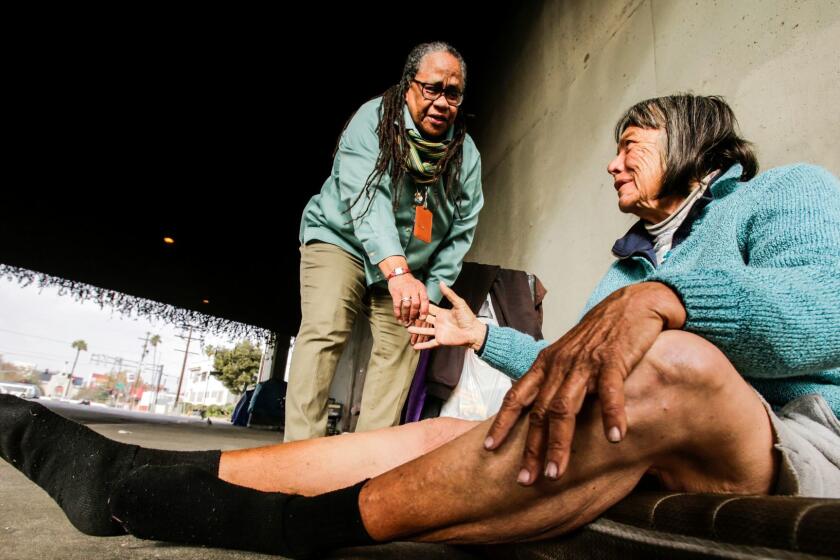Jeanette Rowe, who brought homeless services to people in the streets of L.A., dies at 72

- Share via
Jeanette Rowe, a pioneer in bringing homeless services into the streets instead of dumping people on Skid Row, or expecting them to scale bureaucratic mountains, has died at 72.
Mayor Karen Bass’ Inside Safe encampment clearances and other modern homeless programs were “built on the shoulders” of Rowe, the agency’s current director said. Rowe took the Los Angeles Homeless Services Authority’s emergency response team from two to 85 staff members.
“Not everyone would feel comfortable seeking help because of levels of depression, hopelessness and other challenges,” said LAHSA executive director Va Lecia Adams Kellum. “The notion someone goes to the encampment gives inspiration to them.”
Within a year of her 2016 retirement from LAHSA, Rowe took a position as head of programs at the Midnight Mission on Skid Row, where she overcame institutional resistance to build the 110-year-old shelter’s first women’s program.
Rowe called herself “an old hippie,” but few hippies ever worked her punishing six-day weeks, helping people at encampments from the San Gabriel riverbed to Union Station, where she spent a two-day Christmas holiday helping relocate hundreds of people swept out of the landmark’s ornate lobby.
Homeless people were not “service resistant,” she believed — if only someone would listen to what they needed. Besides, she said, “I dig that these people have a choice.”
Outreach workers hit the streets to make contact with homeless people, but with a dearth of housing, they have to concentrate on other ways to help.
Rowe died May 26 at a hospital after a short illness. She is survived by her wife, Karen Jenkins-Galloway; brother Eddie Rowe and sister Marilyn Silver.
Rowe grew up in Newark, N.J., in a poor household that never felt that way. “My mother always said you only need one pair of shoes,” she said.
Her mother kept the back door, and her dinner table, open to people facing hard times.
“I never slept by myself until I left home for college” at Cal State Los Angeles and Dominguez Hills, where she studied music, Rowe said.
She was working as an accountant when the plight of young homeless people in Hollywood drew her into homeless services. At first she worked with homeless families and children, who she found thrived if their bonds to church, school and community were preserved while they got back on their feet.
Midnight Mission President G. Michael Arnold said what passed for outreach back then was rounding up homeless people to drop off at Skid Row shelters, or handing out appointment slips.
“Jeanette realized what she learned applies to everyone being traumatized on the street,” said Arnold, who also headed LAHSA during Rowe’s tenure there.
The homeless service system had floundered for years in fits and starts, Rowe said. Sobering centers, serviced by Skid Row’s “boozer cruise,” and short-term rent vouchers were cut off for lack of funding. Until 2005, officials had no reliable homeless count, which she likened to trying to cook without knowing who’s coming to dinner.
After the 2016 passage of the city’s $1.2-billion homeless housing bond, she felt Los Angeles was “heading in the right direction” and retired from LAHSA. “Housing is key,” she said.
Jeanette Rowe doesn’t buy the charge from businesspeople and residents that homeless people who turn down help are “service resistant.”
Her plan was to rescue animals and organize concerts for homeless people with a musician friend from New York. She did rescue street animals, particularly in her longtime neighborhood of Leimert Park, and organize Skid Row concerts — but her retirement was barely a year old when Arnold hired her at the Midnight Mission, where she worked until her death.
“Her heart just wouldn’t keep her out of the streets,” Arnold said.
Doris Starling, the Midnight Mission’s director of street services access center, called Rowe her friend and mentor.
“She taught me how to motivate people,” said Starling, adding that they often attended women’s basketball games together.
Rowe was a gifted writer, and her program proposals generally won the day — even when they arrived by email at 3 in the morning, Starling said.
“We’d say, ‘Jeanette. Go to bed. Please go to bed,’” Starling said.
More to Read
Sign up for Essential California
The most important California stories and recommendations in your inbox every morning.
You may occasionally receive promotional content from the Los Angeles Times.












